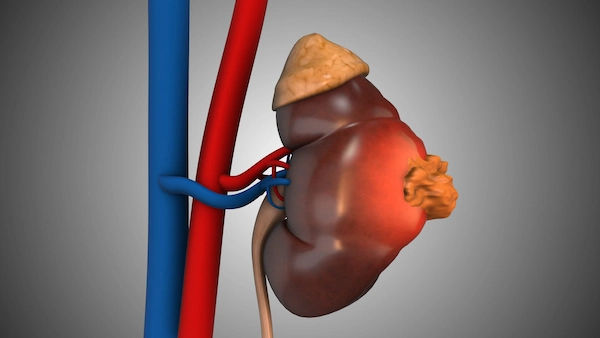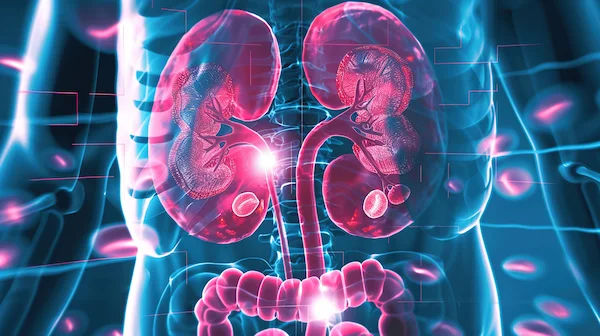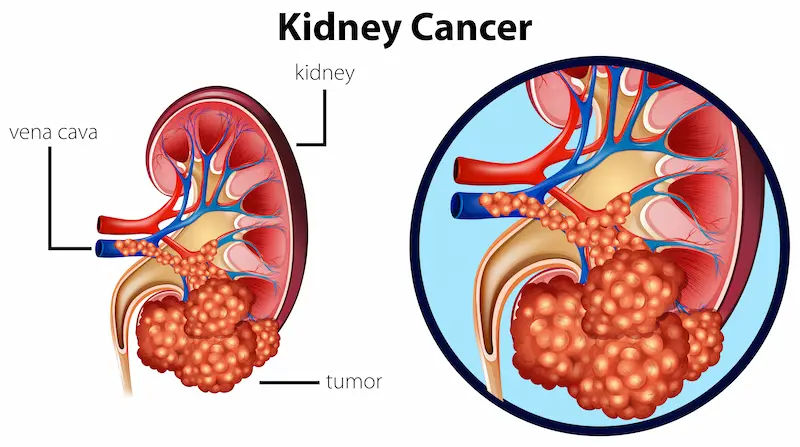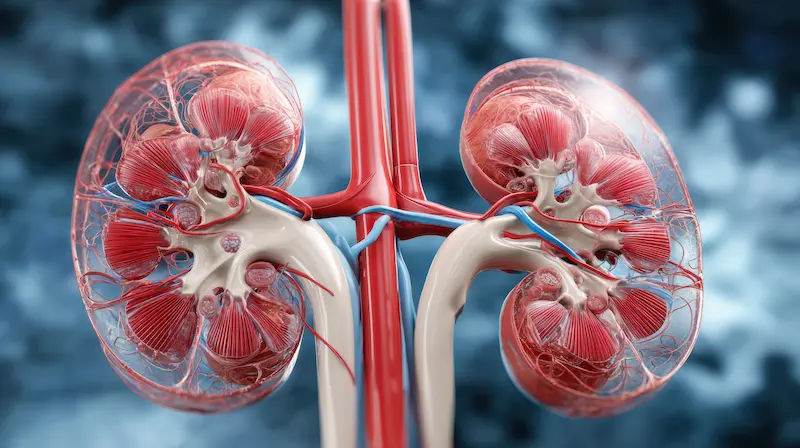Blood in Urine: When to Worry About Kidney Cancer
Discover what blood in urine could mean, when it may signal kidney cancer, and other possible causes to help you take timely action.

Written by Dr. Dhankecha Mayank Dineshbhai
Reviewed by Dr. Vasanthasree Nair MBBS
Last updated on 13th Jan, 2026
.webp?tr=q-80,f-webp,w-350,dpr-2,c-at_max 700w)
Introduction
Discovering blood in your urine can be a frightening experience. Your mind might immediately jump to the worst-case scenario, such as kidney cancer. While it's true that haematuria, the medical term for blood in urine, is a primary symptom of kidney cancer, it's crucial to understand that it's more commonly caused by far less serious conditions. This guide will walk you through what blood in your urine could mean, from common infections to the signs that warrant immediate medical attention. We’ll demystify the diagnostic process, explain the link to kidney cancer, and emphasise the most important step: consulting a healthcare professional for an accurate diagnosis. Remember, noticing this symptom is your body sending a signal, and acting on it promptly is the key to managing your health effectively, whether the cause is minor or major.
Understanding Blood in Urine (Haematuria)
Haematuria simply means red blood cells are present in your urine. However, not all haematuria is the same. It's categorised into two main types, which are important for understanding the potential severity.
Gross Haematuria: When You Can See the Blood
Gross haematuria means the blood is visible to the naked eye. Your urine may appear pink, red, brown, or tea-colored. Sometimes, you might even see small clots. The amount of blood doesn't necessarily correlate with the seriousness of the condition. Even a small amount that causes a pink hue should be taken seriously. It's an unmistakable sign that something is wrong within your urinary tract, which includes the kidneys, ureters (tubes from kidneys to bladder), bladder, or urethra.
Microscopic Haematuria: The Hidden Sign
Microscopic haematuria is when the blood is only detectable under a microscope. The urine looks completely normal. This form is often discovered incidentally during a routine check-up or when being tested for another issue. Just because you can’t see it doesn’t mean it’s harmless. Persistent microscopic haematuria requires investigation to rule out underlying conditions, including cancers of the kidney or bladder. If your doctor finds microscopic haematuria, they will likely recommend further tests to determine the cause.
Consult a Urologist for the best advice
Is It Always Kidney Cancer? Other Common Causes of Haematuria
The short answer is no, blood in urine is not always kidney cancer. In fact, most of the time, it is caused by other, more common issues. Understanding these can help alleviate anxiety while reinforcing the need for a proper diagnosis.
Urinary Tract Infections (UTIs) and Kidney Stones
These are among the most frequent culprits.
- UTIs: When bacteria infect any part of the urinary system, it can cause inflammation and bleeding, often accompanied by a burning sensation during urination, a strong urge to urinate, and pelvic pain.
- Kidney Stones: Crystals that form in the kidneys can irritate or block the urinary tract, leading to sharp, severe pain and often visible blood. The bleeding typically occurs when a stone moves or causes an obstruction.
Enlarged Prostate and Strenuous Exercise
- Enlarged Prostate (BPH): In men, a common cause of haematuria, especially as they age, is an enlarged prostate gland. The prostate surrounds the urethra, and when it enlarges, it can compress the urethra and cause bleeding.
- Strenuous Exercise: Marathon runners and other endurance athletes can sometimes develop blood in their urine due to bladder trauma, dehydration, or the breakdown of red blood cells. This is usually temporary but should still be evaluated.
Medications and Less Common Conditions
Certain blood thinners (like aspirin or warfarin), antibiotics, and even some pain relievers can cause haematuria. Less common causes include inherited disorders like sickle cell anaemia, kidney diseases like glomerulonephritis (inflammation of the kidney's filters), or injuries to the kidney from a blow or accident.
The Link Between Blood in Urine and Kidney Cancer
While haematuria has many causes, its connection to kidney cancer cannot be ignored. It is the most common presenting symptom of renal cell carcinoma, the most prevalent type of kidney cancer in adults.
How Kidney Tumors Cause Bleeding
The kidneys are blood-filtering organs. When a tumour grows in the kidney, it can invade nearby blood vessels or cause them to rupture, leading to blood leaking into the urine. Often, this bleeding is painless, which is why it can be overlooked. The absence of pain can mistakenly make the symptom seem less urgent. Other symptoms that may accompany haematuria in kidney cancer include persistent pain in the side or lower back, a lump in the abdomen, unexplained weight loss, fatigue, and intermittent fever.
Key Risk Factors for Kidney Cancer
Knowing the risk factors can help you and your doctor assess the likelihood. Key factors include:
- Smoking: Smokers have a significantly higher risk than non-smokers.
- Obesity: High body mass index (BMI) is linked to changes in hormones that can increase risk.
- High Blood Pressure: Long-term hypertension is a known risk factor.
- Family History: Having a close relative with kidney cancer increases your risk.
- Certain Genetic Conditions: Diseases like von Hippel-Lindau syndrome predispose individuals to kidney cancer.
If you have one or more of these risk factors and notice blood in your urine, it is especially important to seek prompt medical evaluation.
Diagnosing the Cause of Blood in Your Urine
If you report blood in your urine, your doctor will follow a systematic approach to find the source. If symptoms like painless haematuria persist beyond two weeks, consult a doctor online with Apollo24|7 for further evaluation. The process typically involves the following steps:
Initial Tests: Urinalysis and Blood Tests
- Urinalysis: This test confirms the presence of red and white blood cells, checks for infection, and looks for abnormal cells.
- Blood Tests: These assess your overall kidney function (e.g., creatinine levels) and can check for anaemia or other abnormalities.
Imaging Scans: CT, MRI, and Ultrasound
Imaging is critical for visualising the kidneys and urinary tract.
- CT Scan (CT Urogram): This is the gold standard. It provides detailed, 3D images that can detect tumors, stones, and other abnormalities.
- Ultrasound: A non-invasive test that uses sound waves to create images. It's excellent for distinguishing between solid tumors (which could be cancer) and fluid-filled cysts.
- MRI: Used in specific cases to provide detailed soft-tissue images.
The Cystoscopy Procedure
If the source of bleeding isn't found in the kidneys, a urologist may perform a cystoscopy. A thin, flexible tube with a camera (cystoscope) is inserted through the urethra to examine the inside of the bladder and urethra for any signs of disease, such as bladder cancer. Apollo24|7 offers convenient home collection for tests like urinalysis, making the initial diagnostic steps easier.
Your Health Assessed
Conclusion
Finding blood in your urine is a powerful signal from your body that demands attention. While it's natural to fear the worst, remember that many benign conditions are far more common causes than kidney cancer. However, the possibility of a serious condition like kidney cancer is precisely why this symptom should never be ignored. The journey from noticing a symptom to getting a diagnosis can feel daunting, but it is a proactive step toward safeguarding your health. Modern medicine offers clear diagnostic pathways and a range of effective treatments for kidney cancer, especially when caught early. Your most important action is to consult a healthcare professional who can guide you through the necessary tests and provide peace of mind or a clear treatment plan. Your vigilance could make all the difference.
Consult a Urologist for the best advice
Consult a Urologist for the best advice

Dr. Ramesh H
Urologist
16 Years • MBBS, MS , Mch( Urology)
Bengaluru
Apollo Clinic, JP nagar, Bengaluru

Dr. Sudhakar G V
Urologist
25 Years • MBBS, MS(Gen.Surgery), DNB Urology
Bengaluru
Apollo Clinic, JP nagar, Bengaluru

Dr. Pavan Kumar S K
Urologist
11 Years • MBBS, MS , Mch( Urology) DNB (Urology)
Bengaluru
Apollo Clinic, JP nagar, Bengaluru

Dr. Prabir Basu
Urologist
19 Years • MBBS, MS General Surgery, DNB Genito-Urinary Surgery
Jodhpur Park
Dr. Prabir Basu urology clinic, Jodhpur Park
(200+ Patients)

Dr. Murali Venkatraman
Urologist
25 Years • MBBS, MS (Gen. Surg.), DNB & MCh (Uro)
Chennai
Apollo Hospitals Greams Road, Chennai
(25+ Patients)
Consult a Urologist for the best advice

Dr. Ramesh H
Urologist
16 Years • MBBS, MS , Mch( Urology)
Bengaluru
Apollo Clinic, JP nagar, Bengaluru

Dr. Sudhakar G V
Urologist
25 Years • MBBS, MS(Gen.Surgery), DNB Urology
Bengaluru
Apollo Clinic, JP nagar, Bengaluru

Dr. Pavan Kumar S K
Urologist
11 Years • MBBS, MS , Mch( Urology) DNB (Urology)
Bengaluru
Apollo Clinic, JP nagar, Bengaluru

Dr. Prabir Basu
Urologist
19 Years • MBBS, MS General Surgery, DNB Genito-Urinary Surgery
Jodhpur Park
Dr. Prabir Basu urology clinic, Jodhpur Park
(200+ Patients)

Dr. Murali Venkatraman
Urologist
25 Years • MBBS, MS (Gen. Surg.), DNB & MCh (Uro)
Chennai
Apollo Hospitals Greams Road, Chennai
(25+ Patients)
More articles from Kidney Cancer
Frequently Asked Questions
Can blood in urine come from something I ate, like beetroot?
Yes, eating foods like beets, blackberries, or rhubarb can turn your urine pink or red. This is called food-induced discolouration and is not true haematuria. A simple urinalysis can quickly distinguish between food pigment and actual blood cells.
I'm a woman, and I see blood in my urine during my period. Should I be concerned?
It can be difficult to distinguish urinary blood from menstrual blood. If you notice blood in your urine at a time unrelated to your period, or if you are post-menopausal, it is essential to see a doctor to rule out a urinary tract cause.
What are the early signs of kidney cancer besides blood in urine?
Other early signs can be subtle and include persistent pain in your side or lower back, unexplained weight loss, loss of appetite, fatigue, and a persistent fever that comes and goes without an infection.
If the bleeding stops on its own, do I still need to see a doctor?
Absolutely. The fact that bleeding stops does not mean the underlying cause has resolved. Intermittent bleeding is common with tumors, so a thorough evaluation is still necessary.
How is microscopic haematuria treated?
Treatment depends entirely on the cause. If no serious cause is found after a complete workup, your doctor may recommend monitoring with periodic urine tests and blood pressure checks rather than immediate treatment.






